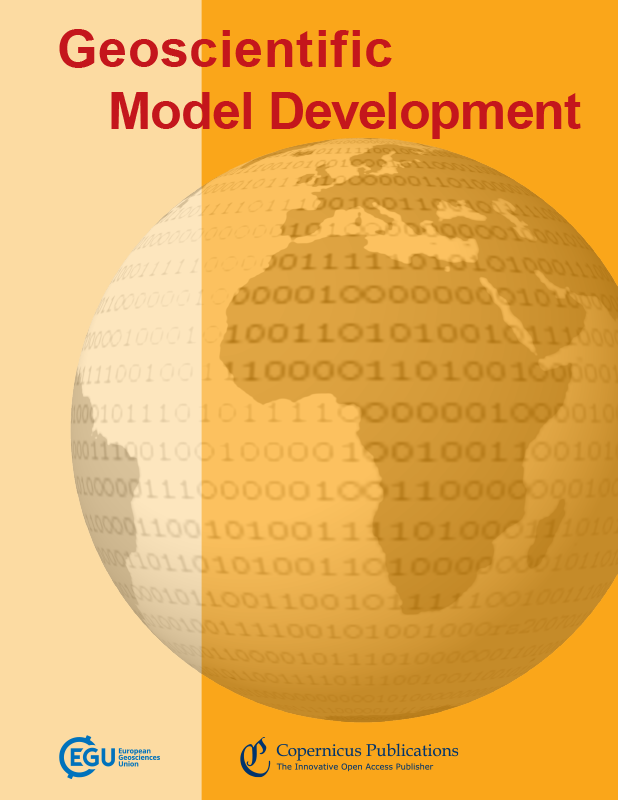数据同化集成联合工作(JEDI-MPAS 2.0.0-beta)的跨尺度预测模型-大气的数据同化:三维集合变量(En-3DEnVar)同化组合
IF 4.9
3区 地球科学
Q1 GEOSCIENCES, MULTIDISCIPLINARY
引用次数: 1
摘要
摘要。通过数据同化整合联合努力(JEDI)与跨尺度大气预测模式(MPAS-A)(即JEDI- mpas)展示了三维集成变分(En-3DEnVar)数据同化的集合。基本的软件构建块从先前提出的确定性3DEnVar功能中重用,并与MPAS-Workflow中的正式实验工作流管理器相结合。En-3DEnVar用于生成80个成员的分析集合,在1个月的实验中循环使用集合预测。在每个分析时间,集合预测近似于纯流相关的背景误差协方差(BEC)。En-3DEnVar的BECs和先前的集合平均预测误差与使用数据同化研究试验台(DART)集合调整卡尔曼滤波(EAKF)的类似实验产生的误差进行了比较。使用En-3DEnVar的实验产生了与EAKF相似的集合分布和略小的误差。在确定性循环3DEnVar实验中,将En-3DEnVar和EAKF分析初始化的集合预报作为BECs,并与使用全球集合预报系统(GEFS)初始条件初始化的20成员MPAS-A预报的对照实验进行比较。尽管GEFS和两个MPAS集成系统在配置上存在许多明显的差异,但在这种确定性循环设置下,实验集成系统的性能基本上与现成集成系统相当或更好。另一个使用混合3DEnVar的实验,将En-3DEnVar集合BEC与气候BEC结合起来,与相应的纯3DEnVar实验相比,提高了对流层预报质量。JEDI-MPAS En-3DEnVar在技术上是可行的,对未来的研究很有用。为了提高性能,需要调整观测误差和分布;为了提高大规模应用的计算效率,需要改进一些算法。本文章由计算机程序翻译,如有差异,请以英文原文为准。
Data assimilation for the Model for Prediction Across Scales – Atmosphere with the Joint Effort for Data assimilation Integration (JEDI-MPAS 2.0.0-beta): ensemble of 3D ensemble-variational (En-3DEnVar) assimilations
Abstract. An ensemble of 3D ensemble-variational (En-3DEnVar) data assimilations is demonstrated with the Joint Effort for Data assimilation Integration (JEDI) with the Model for Prediction Across Scales – Atmosphere (MPAS-A) (i.e., JEDI-MPAS). Basic software building blocks are reused from previously presented deterministic 3DEnVar functionality and combined with a formal experimental workflow manager in MPAS-Workflow. En-3DEnVar is used to produce an 80-member ensemble of analyses, which are cycled with ensemble forecasts in a 1-month experiment. The ensemble forecasts approximate a purely flow-dependent background error covariance (BEC) at each analysis time. The En-3DEnVar BECs and prior ensemble-mean forecast errors are compared to those produced by a similar experiment that uses the Data Assimilation Research Testbed (DART) ensemble adjustment Kalman filter (EAKF). The experiment using En-3DEnVar produces a similar ensemble spread to and slightly smaller errors than the EAKF. The ensemble forecasts initialized from En-3DEnVar and EAKF analyses are used as BECs in deterministic cycling 3DEnVar experiments, which are compared to a control experiment that uses 20-member MPAS-A forecasts initialized from Global Ensemble Forecast System (GEFS) initial conditions. The experimental ensembles achieve mostly equivalent or better performance than the off-the-shelf ensemble system in this deterministic cycling setting, although there are many obvious differences in configuration between GEFS and the two MPAS ensemble systems. An additional experiment that uses hybrid 3DEnVar, which combines the En-3DEnVar ensemble BEC with a climatological BEC, increases tropospheric forecast quality compared to the corresponding pure 3DEnVar experiment. The JEDI-MPAS En-3DEnVar is technically working and useful for future research studies. Tuning of observation errors and spread is needed to improve performance, and several algorithmic advancements are needed to improve computational efficiency for larger-scale applications.
求助全文
通过发布文献求助,成功后即可免费获取论文全文。
去求助
来源期刊

Geoscientific Model Development
GEOSCIENCES, MULTIDISCIPLINARY-
CiteScore
8.60
自引率
9.80%
发文量
352
审稿时长
6-12 weeks
期刊介绍:
Geoscientific Model Development (GMD) is an international scientific journal dedicated to the publication and public discussion of the description, development, and evaluation of numerical models of the Earth system and its components. The following manuscript types can be considered for peer-reviewed publication:
* geoscientific model descriptions, from statistical models to box models to GCMs;
* development and technical papers, describing developments such as new parameterizations or technical aspects of running models such as the reproducibility of results;
* new methods for assessment of models, including work on developing new metrics for assessing model performance and novel ways of comparing model results with observational data;
* papers describing new standard experiments for assessing model performance or novel ways of comparing model results with observational data;
* model experiment descriptions, including experimental details and project protocols;
* full evaluations of previously published models.
 求助内容:
求助内容: 应助结果提醒方式:
应助结果提醒方式:


